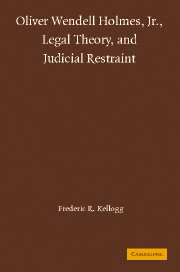Book contents
- Frontmatter
- Contents
- Preface
- 1 A Time for Law
- 2 Playing King: Connections and Misconceptions
- 3 Holmes's Conception of Law
- 4 Common Law Theory Revisited
- 5 Holmes and Legal Classification
- 6 The General Theory of Liability
- 7 Morals and Skepticism in Law
- 8 Judges, Principles, and Policy
- 9 Common Law Constitutionalism
- 10 Holmes's Theory in Retrospect
- 11 Conclusion
- Appendix
- Bibliography
- Index
- Frontmatter
- Contents
- Preface
- 1 A Time for Law
- 2 Playing King: Connections and Misconceptions
- 3 Holmes's Conception of Law
- 4 Common Law Theory Revisited
- 5 Holmes and Legal Classification
- 6 The General Theory of Liability
- 7 Morals and Skepticism in Law
- 8 Judges, Principles, and Policy
- 9 Common Law Constitutionalism
- 10 Holmes's Theory in Retrospect
- 11 Conclusion
- Appendix
- Bibliography
- Index
Summary
I have a learned friend, whose name would be well recognized if I were to disclose it, who though active in supporting conservative judicial nominees confides deep misgivings about the philosophical basis of contemporary judicial conservatism. For my part I have long had misgivings about contemporary legal philosophy, which I find to be illuminating, if not parallel, in regard to my friend's central concern, the basis for judicial restraint. In part, this book is an attempt to place this issue in a broader historical and theoretical context, I hope neither innately liberal nor conservative, as those terms are popularly understood.
More important, this is a book about Oliver Wendell Holmes, Jr., and his contribution to legal theory. These subjects converge because, even while Holmes was engaged in refining a concept of law grounded in the philosophy of the common law, the intellectual landscape in England and America was changing. Holmes's classic treatise, The Common Law, has never been adequately understood as a reconceptualization of common law opposing the legal positivism of John Austin and Thomas Hobbes. Legal positivism became influential in England and America with John Austin's Lectures on Jurisprudence (1861) and was reinforced by H. L. A. Hart in the following century. It has come to dominate theories of law, both liberal and conservative. Now, with legal positivism at an impasse, a reconsideration of Holmes may be welcome.
- Type
- Chapter
- Information
- Publisher: Cambridge University PressPrint publication year: 2006



